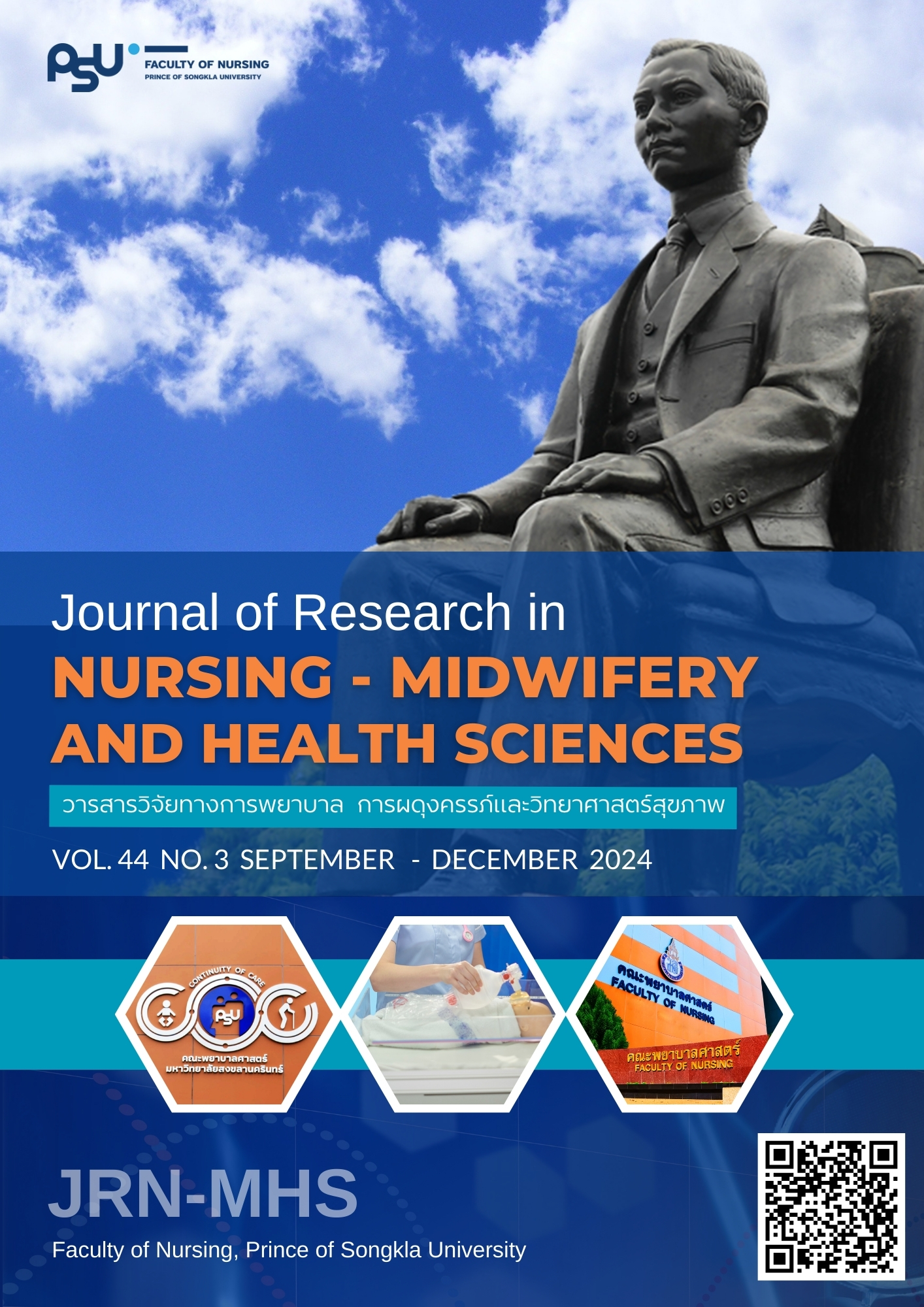Development of a Blended Learning Model for Nursing Students in Nursing Practicum for Healthy Children During COVID-19 Pandemic
Main Article Content
Abstract
Objective: This study aimed to develop a blended learning model for nursing students in nursing practicum for healthy children during COVID-19 pandemic. Methods: Four phases of research and development were conducted, comprising (1) analyzing the situation and needs, (2) developing a blended learning model, (3) try out a blended learning model, and (4) assessing students’ satisfaction. There were eight pediatric nursing lecturers involved in the developing phase. Sample were fifty-five of fourth-year nursing students. The research instrument included 1) the blended learning model for nursing students in nursing practicum for healthy children and its manual, 2) the demographic data questionnaire, and 3) satisfaction questionnaire. Descriptive statistics were used to analyze the data. Results: The blended learning model for nursing students in nursing practicum for healthy children includes three components. There are 1) the nursing practicum for healthy early childhood using case-based learning, 2) growth assessment and promotion in early childhood based on the scenario, and 3) developmental assessment and promotion in early childhood based on the scenario. The students’ satisfaction on the blended learning model based on scenario was at the high level (M = 4.27, SD = .55). Conclusion: The blended learning model for nursing students in nursing practicum for healthy children included learning activities that enhance the course learning outcomes achievement, especially during the limitation of clinical practice due to pandemic of communicable disease.
Article Details

This work is licensed under a Creative Commons Attribution-NonCommercial-NoDerivatives 4.0 International License.
References
Hanphichai S, Julsawat T. The effects of the epidemic of the corona virus-2019: Toward the new-normal community in Lop Buri Province. JRKA. 2021; 6(9): 126-41. Thai.
Asian-Pacific Parliamentarians’ Union Division, Bureau of Inter-Parliamentary Organizations,The Secretariat of the House of Representatives. Summary of Thailand’s measures and operations towards the epidemic situation of the Coronavirus Disease 2019, Issue 5, between May-June 2021 [internet]. 2021 [cited 2021 Jun 30]. Available from: https://www.parliament.go.th/ewtadmin/ewt/parliament_parcy/ewt_dl_link.php?nid=79829&filename=index
Faculty of Nursing, Prince of Songkla University. Baccalaureate curriculum 2016 [internet]. 2016 [cited 2021 May 2]. Available from: https://www.nur.psu.ac.th/nur/file_courses/bachelor1_edit06012561_2559.pdf
Bunmachu D, Klungchunan T, Kaewlee P. Effects of e-learning on learning achievements of nursing student in child and adolescent nursing I, Faculty of Nursing, Ubon Ratchathani University. RHPC9 Journal. 2021; 15(37): 352-64. Thai.
Thangkratok, P, Lhimsoonthon B, Palacheewa N. Online nursing education during the coronavirus-19 pandemic: A case study of the epidemiology course. JTNMC. 2021; 36(3): 31-44. Thai.
Soraphum T, Imwut S. Development of learning management online teaching with mobile learning in form of active learning to develop the potential of teachers in the spread coronavirus disease 2019 crisis. itm.j. 2021; 8(2): 48-62. Thai.
Raksakul R, Yamrung R, Suthasinobon K. Hyflex learning: The next normal instructional strategies. JEIL. 2023; 3(1): 89-100. Thai.
Meekaew S. Learning management in the epidemic situation of the coronavirus disease 2019 (covid-19) with the use of application for elementary school students. phdssj. 2022; 1(2): 23-34. Thai.
Chansungnoen J. Simulation based learning: Nursing education. J.SCT. 2021; 14(1): 145-53. Thai.
Thinsandee T, Sangchatree P. 5 models for teaching management in emerging disease situations. Ratanabuth Journal. 2021; 3(3): 66-73. Thai.
Supakwarakul C, Hoksuwan S, Chomphulong N. A development of instructional system with hybrid learning for undergraduate
students at Rajabhat University. JEM-MSU. 2017; 23(1): 66-77. Thai.
Juithong S. Outcomes of the new normal online blended learning management during COVIO-l9 pandemic towards student teachers’ learning ability. RRBR. 2022; 16(2): 126-34. Thai.
Jerayingmongkol P, Anansirikasem P, Chalardlon P, et al. Family and community nursing II practicum course provision under the COVID-19 situation: The effects of blended learning on learning outcomes. JONAE. 2022; 15(3): 71-81. Thai.
Takaree S, Janthanakul P, Niwasanon R, et al. Outcome of online learning practice management in nursing students during the epidemic situation of coronavirus 2019: Case study of the comprehensive nursing practicum midwifery. JNSU. 2022; 23(45): 73-88. Thai.
Cheevakasemsook A. Nursing teaching and learning management with blended learning in new normal era. JHNR. 2021; 37(1): 25-37. Thai.
Kanjanawasee S. Research and development for Thai education. SERJ. 2016; 8(2): 1-18. Thai.
Bureau of Nutrition, Department of Health, Ministry of Public Health. A guide to the growth reference criteria for children ages 6-19 [internet]. 2020 [cited 2023 Jul 13]. Available from: https://nutrition2.anamai.moph.go.th/th/kidgraph
Rueangsawat S, Saetew P, Choome P. The effect of blended learning management on 21st century learning skills for nursing students, Boromarajonani College of Nursing, Surat Thani. JRTAN. 2020; 21(1): 235-44. Thai.
Phetkliang F. Blended learning. Journal of Early Childhood Education Management. 2020; 2(2): 67-79. Thai.
Kosawanon S, Rungamornrat S, Panbangpra S. Effect of case study teaching method on critical thinking in nursing students. Nurs Sci J Thai. 2015; 33(3): 99-108. Thai.
Kanhadilok S, Punsumrean T, Mala C. A design of case based learning for promoting learning outcomes in practicum. Songklanagarind J Nurs. 2019; 39(4): 129-37. Thai.
Kumkong M, Amornpiyaphakorn A, Chamnanpok R, et al. Provision of nursing practicum using online system in situation of COVID-19. JNSU. 2021; 22(43): 114-26. Thai.
Eija N, Sari PS, Kristina M, et al. The experiences of health sciences students with hybrid learning in health sciences education - A qualitative study. Nurse Educ Today. 2024; 132: 106017. doi: 10.1016/j.nedt.2023.106017.
Mensonen M, Pramila-Savukoski S, Mikkonen K, et al. The experiences of social and health care and health sciences educators of implementing hybrid teaching in higher education: A qualitative study. Nurse Educ Today. 2024; 133: 106079. doi: 10.1016/j.nedt.2023.106079.
McCutcheon K, O’Halloran P, Lohan M. Online learning versus blended learning of clinical supervisee skills with pre-registration nursing students: A randomized controlled trial. IJNS. 2018; 82: 30-9. doi: 10.1016/j.ijnurstu.2018.02.005.


